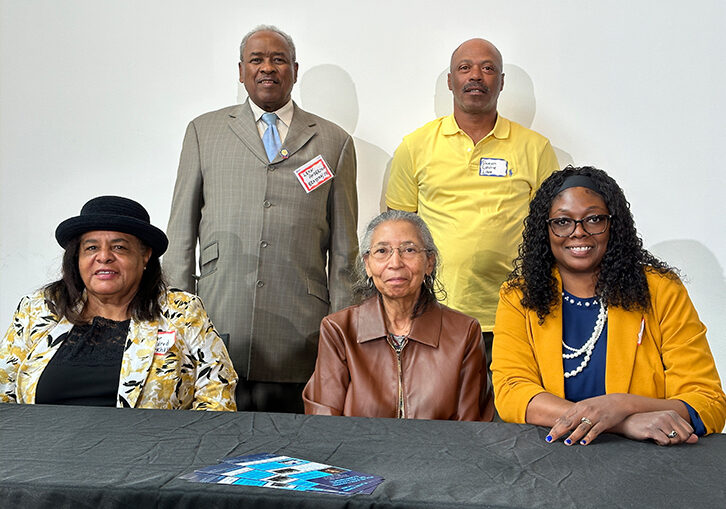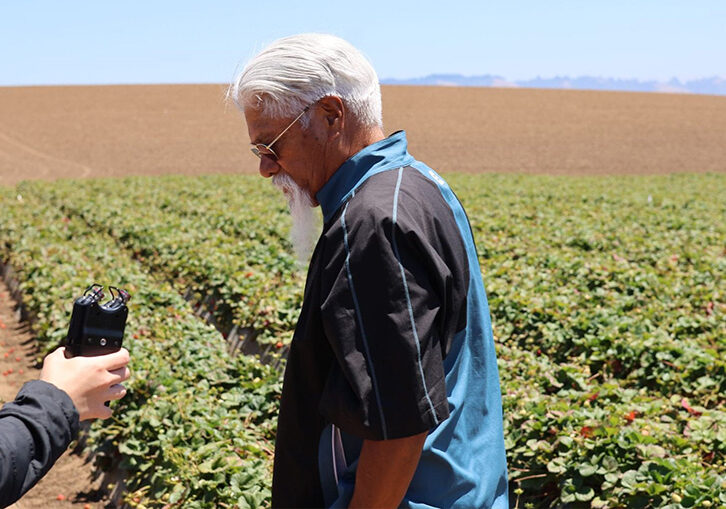Public Humanities Award for Leadership in Practice and Community
The CHCI Public Humanities Network is proud to announce the two recipients of the inaugural Public Humanities Award for Leadership in Practice and Community: Pathways to Freedom, nominated by the Oklahoma Center for the Humanities, University of Tulsa; and Watsonville is in the Heart, nominated by The Humanities Institute, UC Santa Cruz.
Honorable mentions include Culture and Community at the Penn Center National Historic Landmark District, nominated by the Willson Center, University of Georgia; and The Baltimore Field School and Building Ethical Community and University Partnerships, nominated by the Dresher Center for the Humanities, University of Maryland Baltimore County.
Awardee centers and institute and their community partnerships will be recognized at the upcoming Annual Meeting during the Public Humanities Network's session.
Awards
Pathways to Freedom, Oklahoma Center for the Humanities, University of Tulsa. Nominated by Sean Latham.

Five mayors from All-Black Towns, gathered by the Oklahoma Center for the Humanities. Top (Left to Right): Mayor Leon Anderson, Grayson; Mayor Shawn Louie, Lima. Bottom (Left to Right): Mayor Mildred Burkhalter, Rentiesville; Mayor Francis Shelton, Boley; Mayor Keisha Currin, Tullahassee.
In 2021, The University of Tulsa’s Oklahoma Center for the Humanities (OCH), with grant support provided by the SSRC and NEH, sought to expand its public operations significantly by relocating from campus to downtown and tackling urgent community challenges. This work developed through a series of exhibitions and supporting events around the theme of freedom from summer 2022 to spring 2023, all developed in close collaboration with BIPOC communities across the state. This work transformed OCH from a campus-based research organization into an engaged public humanities initiative. As part of this initiative, they designed three interlocking exhibitions and symposia:
- Musical Legacies of the Dust Bowl: a broad-based exploration of the creative aftermath of the nation’s most devastating encounter with human-caused climate change, which focused on Black and indigenous musical innovation in the 1930s and 40s.
- The All-Black Towns of Oklahoma: an exhibition and national symposium on these historic towns, largely unique to Oklahoma, that took shape at the conjunction of the Great Migration and the initial burst of Black wealth generated by the state’s oil boom.
- The Work of Sovereignty: an art exhibition and national conference on the cultural impact of the 2020 McGirt decision, organized in close cooperation with TU’s Law School as well as the attorneys general of Cherokee and Chickasaw nations.
Watsonville is in the Heart, The Humanities Institute, UC Santa Cruz. Nominated by Pranav Anand and Irena Polic.

Anastacio “Stosh” Asuncion discussing his family’s experience as strawberry sharecroppers as a part of ‘Watsonville is in the Heart,’ which supports artistic research and oral history about Filipino migration and labor in the city of Watsonville and greater Pajaro Valley.
Watsonville is in the Heart (WIITH) at The Humanities Institute at UC Santa Cruz is a community-driven public history initiative to preserve and uplift stories of Filipino migration and labor in the city of Watsonville and greater Pajaro Valley through oral history interviewing, digital archiving, curriculum development, and exhibition curation. The Humanities Institute helped launch this collaborative project, providing seed funding and research development support, creating positions for undergraduate and graduate fellows, and connecting the team with the Santa Cruz Museum of Art and History.
WIITH's 2024 exhibition Sowing Seeds: Filipino American Stories from the Pajaro Valley at the museum features materials from the first-ever Digital Archive on Filipino Americans in the Pajaro Valley and works by contemporary artists. The team has also created high school-level Ethnic Studies lesson plans based on their original research. WIITH’s work to formally archive and elevate not only the history of racial violence against Filipino American communities in the region but also memories of vitality and resilience is having a significant impact both locally and globally, reshaping narratives and fostering a more nuanced and comprehensive historical understanding of the multidimensionality of Asian American immigrant experiences.
Honorable mentions
The Baltimore Field School and Building Ethical Community and University Partnerships, Dresher Center for the Humanities, University of Maryland Baltimore County. Nominated by Nicole King, Sarah Fouts, Jessica Berman, Courtney Hobson.
The Baltimore Field School (BFS) at the University of Maryland, Baltimore County (UMBC) is an innovative humanities-based training intensive connecting faculty, staff, and students to community partners in the Baltimore region. The program is designed to create an infrastructure of engagement for those at UMBC to collaborate with community partners in Baltimore in ways that share power and are mutually beneficial. BFS is built on ethical principles for collaborative public humanities work with community partners and presupposes that relationship-building emerges organically “in the field” through faculty, staff, and students working directly in city neighborhoods with Baltimore residents. Universities have long served as agents of gentrification and employed extractive research practices in cities across the United States. BFS addresses these concerns directly by collectively exploring them and rethinking “the field” of community engagement. We aim to move beyond a solely placed-based understanding of fieldwork towards an ethos focused on ongoing, human interactions and mutual trust. Since 2020, two iterations of BFS, funded by the Mellon Foundation, the American Council of Learned Societies, and other funders, have unfolded.
Culture and Community at the Penn Center National Historic Landmark District, Willson Center, University of Georgia. Nominated by Nicholas Allen and Barbara McCaskill.
Culture and Community at the Penn Center National Historic Landmark District is a partnership between Penn Center and the University of Georgia Willson Center for Humanities and Arts, funded by a grant from the Mellon Foundation. The partnership is designed to support education and sharing among communities in the Sea Islands region of the Southeastern United States and students from UGA and its partner institutions. Located on St. Helena Island, one of the South Carolina Sea Islands, Penn Center is a nonprofit organization committed to African American education, community development and social justice. Penn Center is situated within the Gullah Geechee Cultural Heritage Corridor, a National Heritage Area established by the U.S. Congress to recognize the unique culture of the Gullah Geechee people - descendants of formerly enslaved West and Central Africans who have traditionally resided in the coastal areas of North Carolina, South Carolina, Georgia and Florida.
The project is centered around three major programs: annual artist residencies; summer research residencies for students at UGA and partner institutions throughout the southeastern U.S., both public and private; and public conversations on issues of relevance to the communities of the Sea Islands region, which focus on connections between these coastal communities and global, diasporic themes.